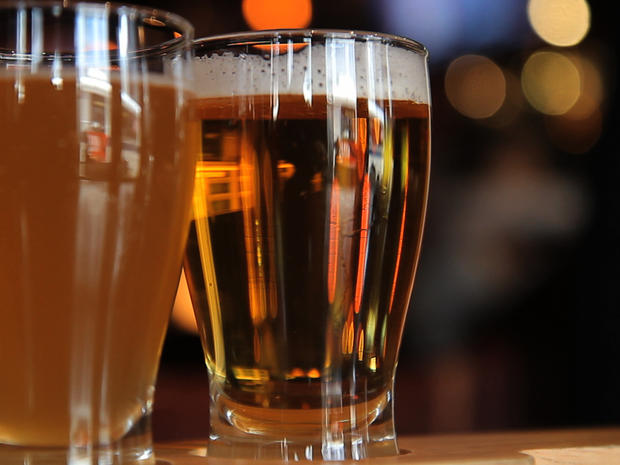Beer drinkers' speed tied to shape of glass
(CBS News) If you really want to nurse your beer, you may want to ask for it in a straight glass instead of a curved one.
A new study shows that the shape of one's beer glass affects how fast people gulp down the beverage.
"People often talk of 'pacing themselves' when drinking alcohol as a means of controlling levels of drunkenness, and I think the important point to take from our research is that the ability to pace effectively may be compromised when drinking from certain types of glasses," Dr. Angela Attwood, a research assistant at the School of Experimental Psychology at the University of Bristol in Bristol, England, said in a press release.
The study appeared Aug. 17 in the journal PLoS ONE.
Researchers asked 159 social drinkers between the ages of 18 to 40 who did not have a history of alcoholism to drink a lager or a non-alcoholic soft drink from either a straight or curved glass.
On average, it took people drinking beer out of a straight glass 11 minutes to finish 12 oz. Those drinking out of the curved glass only took seven minutes. There was no difference in time for people consuming soft-drinks out of either glass.
"Drinking time is slowed by almost 60 percent when an alcoholic beverage is presented in a straight glass compared with a curved glass," the scientists wrote.
The subjects were also asked to look at partially filled straight and curvy glasses and say if they were more or less than half full. They were more likely to get the answer right when the glass was straight.
Researchers believe that people had a hard time judging and pacing themselves with the curvy glass because of the shape. They suggested that changing the shape of the glass beer is served in may "nudge" people to make better alcohol consumption choices. Attwood told the BBC that the lack of difference among the soda drinkers was probably because they weren't as concerned about how fast they drank the soft drinks.
"Due to the personal and societal harms associated with heavy bouts of drinking, there has been a lot of recent interest in alcohol control strategies," Attwood said in the press release. "While many people drink alcohol responsibly, it is not difficult to have 'one too many' and become intoxicated. Because of the negative effects alcohol has on decision making and control of behavior, this opens us up to a number of risks."
The study only looked at the time to finish only one drink, so researchers are curious to see if the effect lasts throughout a night of drinking.

